|
|
|
Sort Order |
|
|
|
Items / Page
|
|
|
|
|
|
|
| Srl | Item |
| 1 |
ID:
104044
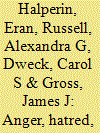

|
|
|
|
|
| Publication |
2011.
|
| Summary/Abstract |
Anger is often viewed as a destructive force in intergroup conflicts because of its links to aggressive behavior. The authors hypothesized, however, that anger should have constructive effects in those with low levels of hatred toward the out-group. Using experimental designs with subsamples of nationwide representative surveys, the authors conducted two studies within the context of the Israeli-Palestinian conflict. Study 1 showed that inducing anger toward Palestinians several weeks before the Annapolis summit increased support for making compromises in upcoming negotiations among those with low levels of hatred but decreased support for compromise among those with high levels of hatred. Study 2 showed that, even when a strong anger induction was used just days before the summit, the anger induction led to increased support for compromise among those low in hatred, but not among those high in hatred. The authors discuss the implications of these findings for informing a psychological understanding of conflicts.
|
|
|
|
|
|
|
|
|
|
|
|
|
|
|
|
| 2 |
ID:
147696
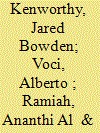

|
|
|
|
|
| Summary/Abstract |
Across one longitudinal and two cross-sectional surveys in Northern Ireland, we tested a model of intergroup relations in which out-group attitudes and behavioral tendencies are predicted by cross-group friendship and positive intergroup appraisals, mediated by intergroup emotions and out-group trust. In study 1, out-group friendship at time 1 predicted out-group trust at time 2 (one year later), controlling for prior out-group trust. In study 2, positive and negative intergroup emotions mediated the effects of friendship on positive and negative behavioral tendencies and attitudes. In study 3, a confirmatory factor analysis indicated that trust and emotions are distinct constructs with unique predictive contributions. We then tested a model in which cross-group friendship predicted intergroup emotions and trust through intimate self-disclosure in out-group friendships. Our findings support an integration of an intergroup emotions framework with research highlighting the importance of cross-group friendship in fostering positive intergroup outcomes.
|
|
|
|
|
|
|
|
|
|
|
|
|
|
|
|
| 3 |
ID:
177018
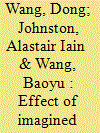

|
|
|
|
|
| Summary/Abstract |
Social identity theory (SIT) suggests that perceived identity difference between groups predicts to intergroup conflict, including interstate conflict. Contact theory suggests that social contact between groups can help reduce intergroup conflict. Contact theory, however, has not traditionally focused on perceived identity difference, and it has not been tested much on real-world interstate conflicts. Employing an experimental design, our study tests for the effects of imagined social contact on Chinese students’ generally malign perceptions of identity difference with Japanese people. We find that imagined contact reduces key perceptions of difference by reducing both perceived Japanese malignity and perceived Chinese benignity. This suggests that social contact helps produce new hybrid in-group. By employing SIT, our findings provide a new microfoundation for contact theory, suggest an important process in the creation of security communities, and provide a proof of concept for public policies aimed at large-scale cultural exchanges.
|
|
|
|
|
|
|
|
|
|
|
|
|
|
|
|
| 4 |
ID:
178720
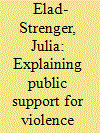

|
|
|
|
|
| Summary/Abstract |
What drives citizens’ support for violence against domestic political actors? Despite its potentially devastating consequences, there is surprisingly little research on the antecedents of this unique form of political violence. Building upon recent insights on the psychological implications of exposure to conflict on support for political violence, we examined the motivations underlying public support for violence against politicians in the context of protracted conflict. Using a two-wave panel design among Jewish-Israelis, we examined the interactive effects of conflict-induced perceived threat, psychological distress, and political orientation on support for violence against politicians. Consistent with previous findings on the psychological implications of conflict, our findings suggest that conflict-induced threat perceptions play an important role in predicting support for violence against politicians. Nevertheless, our findings point to important boundary conditions to these effects: the strength of the relationship between perceived threat and attitudes towards political violence is qualified by the level of chronic conflict-related psychological distress, and the direction of the effects of perceived threat is qualified by individuals’ self-placement on the left-right continuum. More specifically, we found that perceived threat increased rightists’ support and decreases leftists’ support for violence against politicians, only under high, but not low, conflict-related psychological distress. The main conclusion of this study is that support for violence against politicians can be seen as an ideology-driven protective strategy against the negative psychological implications of exposure to violent conflict. By pointing to the importance of understanding the interactive role of psychological and political factors in determining public support for such acts, our findings therefore contribute to the understanding of a relatively understudied phenomenon with potentially catastrophic effects on political stability.
|
|
|
|
|
|
|
|
|
|
|
|
|
|
|
|
| 5 |
ID:
150992
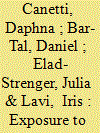

|
|
|
|
|
| Summary/Abstract |
Does ongoing exposure to political violence prompt subject groups to support or oppose compromise in situations of intractable conflict? If so, what is the mechanism underlying these processes? Political scholarship neither offers conclusive arguments nor sufficiently addresses individual-level forms of exposure to violence in the context of political conflict, particularly the factors mediating political outcomes. We address this by looking at the impact of exposure to political violence, psychological distress, perceived threat, and ethos of conflict on support for political compromise. A mediated model is hypothesized whereby exposure to political violence provokes support for the ethos of conflict and hinders support for compromise through perceived psychological distress and perceived national threat. We examined representative samples of two parties to the same conflict: Israelis (N = 781) and Palestinians from Gaza, East Jerusalem, and the West Bank (N = 1,196). The study’s main conclusion is that ethos of conflict serves as a mediating variable in the relationship between exposure to violence and attitudes toward peaceful settlement of the conflict.
|
|
|
|
|
|
|
|
|
|
|
|
|
|
|
|
| 6 |
ID:
182670
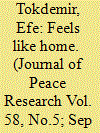

|
|
|
|
|
| Summary/Abstract |
How do people react to foreign actors’ involvement in a conflict in a third party? Many studies have explored how individuals react to their country’s foreign policy choices, as well as how they react to the policies targeting their countries. Yet, we know less about how they form their attitudes regarding the policies not directly aiming at their own countries, and hence, their well-being. Building on intergroup relations and employing a social psychological approach, this article argues that identity serves as a heuristic through which individuals evaluate foreign actors, and their policies targeting in- and out-group members living abroad. Conducting a survey experiment in Turkey, I test my claims in the context of the Syrian Civil War. The findings of the experiments reveal that transnational identity ties have an impact on attitude formation: Turks and Kurds express positive/negative attitudes towards the USA and Russia conditional on whether their involvement to the conflict favor/disfavor their in-group/out-group across the border. Broadly speaking, the results show that domestic cleavages are of importance in predicting the public’s reaction to the developments in international politics, which implies a necessity of taking domestic politics in designing soft power promotion and public diplomacy strategies for many global and regional powers in attempting to win hearts and minds abroad.
|
|
|
|
|
|
|
|
|
|
|
|
|
|
|
|
| 7 |
ID:
177024
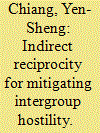

|
|
|
|
|
| Summary/Abstract |
Social scientists have proposed myriad solutions for mitigating intergroup conflicts. While the literature, such as studies on intergroup contact theory, focuses on intergroup relations, we argue that it is important not to ignore intragroup relations that may benefit or undermine the improvement of intergroup relations at the same time. In this paper, we investigate a typology of eight mechanisms for the behavior of intergroup and intragroup relations. Specifically, we focused on interactions in a triad consisting of an actor paired up with two alters—one ingroup and one outgroup. The triadic network enabled us to theorize and test how intergroup and intragroup relations coevolve. We conducted a vignette experiment to test the intergroup relationship between mainland Chinese and Taiwanese. We found strong evidence for one mechanism for improving intergroup hostility: indirect reciprocity—people rewarded the outgroup for behaving friendly to their ingroup peers. Using agent-based simulation, we predicted that the triadic effect found in the one-shot experiment can continuously improve and stabilize intergroup relations over time.
|
|
|
|
|
|
|
|
|
|
|
|
|
|
|
|
| 8 |
ID:
166003
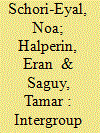

|
|
|
|
|
| Summary/Abstract |
Despite their pernicious effect on intergroup conflict, collateral casualties are seen as inevitable and justified by many members of the groups involved, particularly those who endorse a right-wing ideology. Drawing on social psychological literature, we examined whether a perception of commonality between in-group and out-group can be beneficial for reducing tolerance to collateral causalities. We hypothesized that viewing the out-group as sharing commonalities with the in-group can reduce processes of out-group delegitimization, which are common among right-wingers in intractable conflicts, and may therefore serve to explain reduction in tolerance to collateral casualties. Three correlational studies were conducted among Jewish-Israelis in the context of the conflict with the Palestinians to test this. In Study 1, right-wing political ideology was associated with stronger support for enemy collateral casualties, and the effect was moderated by perceived intergroup commonality. While leftists were overall non-supportive of collateral casualties, rightists who perceived high intergroup commonality were less tolerant of collateral casualties than those low on intergroup commonality. In Study 2, conducted during violent escalation, we replicated these results while controlling for anger, fear, and hatred. In Study 3, we found that the effect was mediated by delegitimization of the out-group. These results extend the range of beneficial impact of intergroup commonality, and imply that it may be used as a tool to promote conflict resolution.
|
|
|
|
|
|
|
|
|
|
|
|
|
|
|
|
| 9 |
ID:
175338
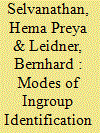

|
|
|
|
|
| Summary/Abstract |
People on both sides of an intergroup conflict undertake various forms of collective action to seek justice for their own group. Three studies investigated whether modes of ingroup identification promoted distinct preferences for justice, which subsequently shaped the form of collective action people supported. Among Arab (Study 1, n = 148) and Jewish Israelis (Study 2, n = 294), we found that ingroup glorification promoted a desire for retributive justice, which predicted support for nonnormative collective action, whereas ingroup attachment promoted a desire for restorative justice, which predicted support for normative collective action. Further, during a period of conflict escalation (i.e., Palestinian protests at the Gaza Strip), emphasizing retributive or restorative justice produced differential effects on the links from glorification and attachment to nonnormative and normative collective action (Study 3, n = 546). This research advances our understanding of when and how collective action can escalate intergroup conflict.
|
|
|
|
|
|
|
|
|
|
|
|
|
|
|
|
| 10 |
ID:
173776
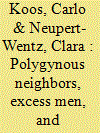

|
|
|
|
|
| Summary/Abstract |
We argue that polygyny creates a social imbalance where few, economically well-off men marry many wives and many poor men marry late or never. By definition, polygyny produces what we refer to as “excess men.” In order to gain material wealth, excess men are likely to raid, plunder, and rob neighboring ethnic groups. We test this hypothesis with georeferenced data on polygyny and intergroup conflict in rural Africa and find strong support. Drawing on Afrobarometer survey data, we explore the underlying mechanisms and find that young men who belong to polygynous groups feel that they are treated more unequally and are readier to use violence in comparison to those belonging to monogamous groups. Our article makes an important contribution to the peace, conflict, and development literature by emphasizing a fundamental aspect of human life: marriage and family.
|
|
|
|
|
|
|
|
|
|
|
|
|
|
|
|
| 11 |
ID:
144754
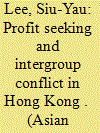

|
|
|
|
|
| Summary/Abstract |
Following a court ruling that babies born to mainlanders in Hong Kong are permanent residents, private hospitals cashed in by expanding services and raising fees, leading to an outburst of anti–mainland Chinese sentiment. This study challenges conventional accounts of intergroup conflicts highlighting economic contradictions between in-group and out-group or faulting the state for blaming local problems on the out-group.
|
|
|
|
|
|
|
|
|
|
|
|
|
|
|
|
| 12 |
ID:
186339
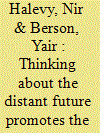

|
|
|
|
|
| Summary/Abstract |
The current research reveals that the pursuit of peace entails an inherent paradox. The urgent need to save lives and alleviate human suffering necessitates swift solutions to the problem of intergroup conflict. However, because the human mind associates peace with longer time horizons, people anticipate peace more when considering the distant rather than the near future. Six experiments demonstrate a robust and large effect whereby thinking about the distant future promotes the prospects of peace compared to thinking about the near future. These experiments also provide evidence for the role that construal fit, that is, the tendency to match high temporal distance with abstractness, plays in this effect. We discuss implications for shorter-term and longer-term peace interventions.
|
|
|
|
|
|
|
|
|
|
|
|
|
|
|
|
|
|
|
|
|